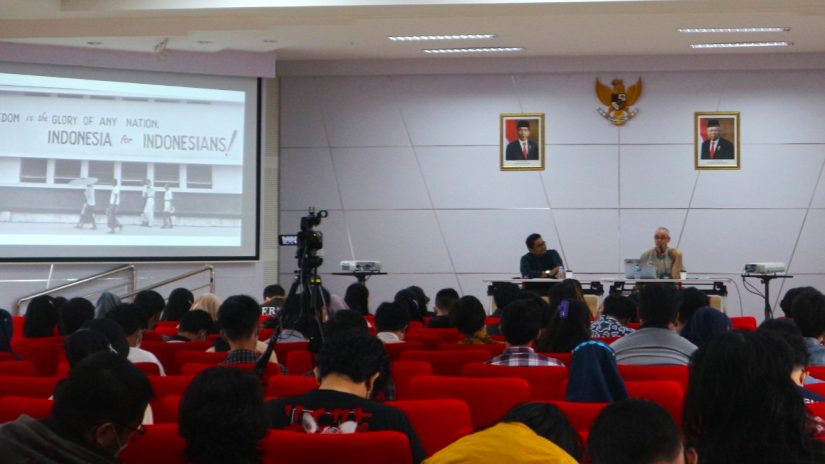
Tuesday (20-9), Department of History UGM conducted a public lecture entitled Towards an End of Colonialism: Mid-Century European Photographers Working for an Independent Indonesia. Brian Arnold from Cornell University became the speaker of this lecture, accompanied by Satrio Dwicahyo, a lecturer from Department of History UGM. In this public lecture, Arnold discussed the power of photography and European photographers who sided with Indonesia.
Photography is often seen as a snippet of the past. In both archives and history books, it seems like a neutral static proof of the actuality of an event. However, Arnold argued that photos are so much more complex than that. It is a powerful tool to disseminate knowledge. “Everything that a photographer experiences affects the decisions they make,” explained Arnold. “What is in the frame is as important as what is not in the frame. All of that creates subjective sensibility in photography.” That subjectivity can be manifested in the way as subtle as the background of a photographer following orders, to concrete ones such as institutionalized interests.
From colonial to digital age, photography in the context of Dutch-Indonesia underwent its own dynamics. Previously, it was a tool for the colonial government to justify colonialism to people back home. However, with the advent of handheld cameras, came the democratization of photography. “(This) allowed counter hegemonic narratives,” explained Arnold.
There are 2 photographers discussed in his work. The first one is Gotthard Schuh. He is often referred to as the father of modernism. He wanted to see the independence of Indonesia, so he captured the Linggarjati Agreement. This desire is affected by his own experiences. He arrived in the Indies in 1931 and published works in 1941. However, his photos are more influenced by romanticism instead of journalism. Beautiful landscapes became an object that often came up in his works.
Change started to be more visible in his essays. As time passed, he realized the complexity of social lives in the Indies. He published another work entitled Iles de Dieux in 1954. Ever since then, he has been known as a renowned photographer and a political activist. He became a photographer in a left-wing media in the Netherlands after. That background affected the photos he took during the Independence of Indonesia in his book, Tanah Air Kita. In that work, there was emphasis on cultural tradition and the social lives of Indonesia. These aspects emphasized modernity from this contemporary nation. “Tanah Air Kita is an honest connection between Indonesia and the outside world,” said Arnold.
The second photographer is Henri Cartier-Bresson. His works were influenced by the surrealist movement in France, which believed that meaning can be created. He arrived in Indonesia in 1949. With his experience fighting and being caught by the Germans in World War 2, he became a supporter of independence. He captured the charisma of Soekarno in his work. Another notable work of his is a picture of Indonesians carrying paintings of the Dutch government from a colonial residence. “The works of Bresson depicted determinism when Indonesia proclaimed its own independence and destiny,” said Arnold.
The development of modernism in photography influenced the type of communication and dissemination of knowledge that changed the colonial system. It brought upon counter hegemonic narratives that sided with Indonesia. “Photography is an important tool to communicate and imagine the social landscape of the 20th century,” he concluded.
Author: Venessa Theonia
